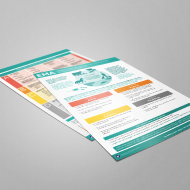European Medicines Agency updates antibiotics advice

The EMA has updated its scientific advice on the risk categorisation of antibiotics for use in animals.
The European Medicines Agency (EMA) has updated its scientific advice on the risk categorisation of antibiotics for use in animals.
The updated advice from EMA’s Antimicrobial Advice Ad-Hoc Experts Group (AMEG) includes new classes of antibiotics and takes into account the need to use antibiotics in animals versus the risk of antimicrobial resistance to public health.
The main change in the new advice is that the four new classes of antibiotics A to D have been identified, replacing the previous three categories. They are:
- category A ('Avoid') includes antibiotics currently not authorised for veterinary use. These medicines cannot be used in food-producing animals and should only be given to pets under exceptional circumstances;
- category B ('Restrict') refers to quinolones, third- and fourth-generation cephalosporins and polymyxins. These are critically important in human medicine and their use in animals should be restricted;
- category C ('Caution') covers antibiotics for which alternatives for human use generally exist, but only few alternatives are available in certain veterinary indications. They should only be used when there are no suitable antibiotics in category D;
- category D ('Prudence') covers antibiotics that may be used in animals in a prudent manner. Group treatment should be restricted to situations where individual treatment is not feasible.
“The EMA’s AMEG constantly reassesses the impact on human health of using different antibiotics in animals, alongside the need to treat disease in animals for health and welfare reasons. This is a unique approach globally,” explains Mr Lloyd.
“The advice also focuses on specific resistance issues within the geographical region of Europe, which is why it is used by the government’s Veterinary Medicines Directorate, RUMA, and most professional veterinary organisations within the UK as the key source of expert guidance.”



 The Veterinary Medicines Directorate (VMD) is inviting applications from veterinary students to attend a one-week extramural studies (EMS) placement in July 2026.
The Veterinary Medicines Directorate (VMD) is inviting applications from veterinary students to attend a one-week extramural studies (EMS) placement in July 2026.